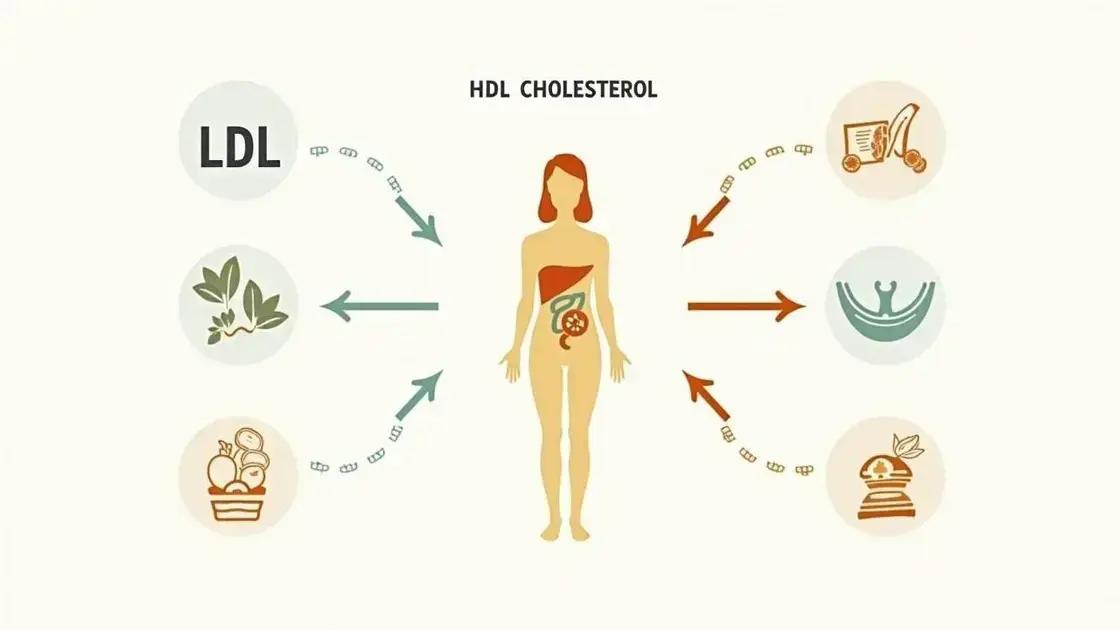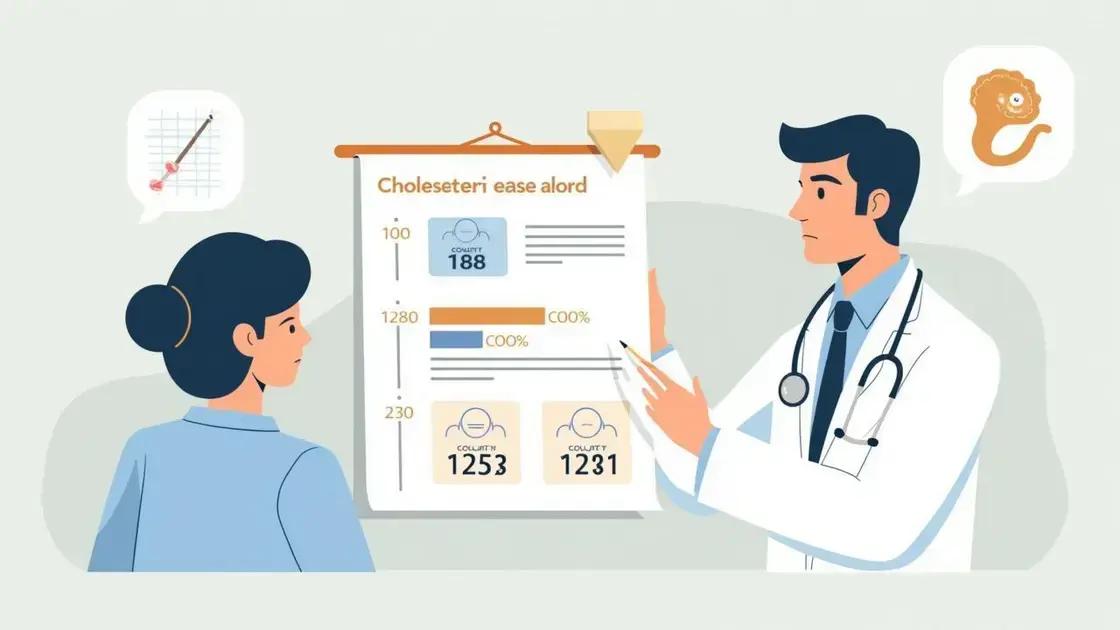Managing cholesterol levels effectively involves understanding cholesterol types, consuming heart-healthy foods like oats and fish, engaging in regular exercise, and consistently monitoring your cholesterol through regular health checks to reduce the risk of cardiovascular diseases.
How to manage cholesterol levels effectively? Cholesterol management is crucial for heart health, and understanding it is the first step toward a healthier life. High cholesterol levels can lead to serious health issues, but with the right strategies, you can take control. In this article, we’ll delve into the types of cholesterol, foods to include in your diet, the importance of exercise, and how to monitor your levels effectively.
Understanding Cholesterol and Its Types

Cholesterol is a waxy substance found in your blood and is necessary for building healthy cells. However, too much cholesterol can lead to health problems. Understanding the different types of cholesterol is essential to managing your levels effectively.
Types of Cholesterol
There are two main types of cholesterol:
- Low-Density Lipoprotein (LDL): Often referred to as ‘bad’ cholesterol. High levels of LDL can lead to plaque buildup in your arteries, increasing your risk of heart disease and stroke.
- High-Density Lipoprotein (HDL): Known as ‘good’ cholesterol. HDL helps remove other forms of cholesterol from your bloodstream, reducing the risk of heart disease.
Balancing these two types is key to maintaining your overall health. Diet and lifestyle choices play a significant role in controlling your cholesterol levels.
Why Cholesterol Matters
Cholesterol is important for several bodily functions, including:
- Producing hormones
- Building cell membranes
- Supporting digestion through bile production
Too much cholesterol can lead to serious health issues, making it vital to monitor and manage your levels regularly.
How to Monitor Cholesterol
Regular blood tests can help you keep track of your cholesterol levels. It’s recommended to have your cholesterol checked every four to six years unless your doctor advises otherwise. Knowing where you stand can help you take necessary actions to manage your levels effectively.
Foods That Help Lower Cholesterol

Eating a diet rich in healthy foods is an effective way to lower cholesterol levels. Below are some key foods that can help:
1. Oats
Start your day with a bowl of oatmeal. It contains soluble fiber, which helps reduce LDL cholesterol. Just one and a half cups can lower your cholesterol by up to 5-10%!
2. Fatty Fish
Fatty fish, such as salmon, mackerel, and sardines, are high in omega-3 fatty acids. These healthy fats can lower triglycerides and boost HDL cholesterol.
3. Nuts
Nuts, especially almonds and walnuts, are great for heart health. They contain unsaturated fats that can help lower cholesterol. A handful a day can make a difference.
4. Olive Oil
Olive oil is a healthy alternative to butter or margarine. It’s rich in monounsaturated fats and antioxidants, which can help lower LDL cholesterol levels.
5. Fruits and Vegetables
Leafy greens, apples, grapes, and berries are perfect for snacks or meals. They are packed with fiber and antioxidants, contributing to better cholesterol management.
6. Legumes
Beans, lentils, and peas are excellent sources of soluble fiber. Including these in your diet can help lower cholesterol and keep you feeling full.
Consider Whole Grains
Whole grains like brown rice, quinoa, and barley are beneficial. They can replace refined grains and provide additional fiber, aiding in cholesterol reduction.
Aim to incorporate these foods into your daily meals. Over time, they can significantly impact your cholesterol levels and overall heart health.
The Role of Exercise in Cholesterol Management

Exercise plays a crucial role in managing cholesterol levels effectively. Regular physical activity can improve heart health and lower both LDL (bad) cholesterol and triglycerides while boosting HDL (good) cholesterol.
Types of Exercise
There are different types of exercises that can benefit cholesterol levels:
- Aerobic Exercise: Activities like walking, running, biking, and swimming increase your heart rate. Aim for at least 150 minutes of moderate aerobic activity or 75 minutes of vigorous activity each week.
- Strength Training: Lifting weights or using resistance bands helps to build muscle and can lead to better cholesterol levels. Try to incorporate strength training exercises at least two days a week.
- Flexibility and Stretching: While less impactful on cholesterol, stretching improves overall body function and helps prevent injuries. Consider yoga or Pilates as part of your routine.
Benefits of Regular Exercise
Engaging in regular exercise offers several benefits for cholesterol management:
- It increases levels of HDL cholesterol, which helps to clear LDL cholesterol from the bloodstream.
- Exercise helps maintain a healthy weight, reducing stress on the heart.
- Being active can improve overall cardiovascular health, reducing the risk of heart disease.
To gain the most from your exercise routine, find activities you enjoy and can stick with long-term. Keeping your body moving is essential for achieving and maintaining healthy cholesterol levels.
Monitoring Your Cholesterol Levels Effectively

Monitoring your cholesterol levels is an essential part of maintaining heart health. Regular checks help you understand where you stand and whether you need to make changes.
When to Get Tested
The American Heart Association recommends that adults have their cholesterol checked every 4 to 6 years. However, if you have risk factors such as family history, obesity, or diabetes, more frequent testing may be necessary.
Understanding Cholesterol Numbers
Your cholesterol results will typically include:
- Total Cholesterol: This is the overall level of cholesterol in your blood.
- LDL Cholesterol: The lower this number, the better. Aim for less than 100 mg/dL.
- HDL Cholesterol: Higher levels are better. Aim for 60 mg/dL or higher.
- Triglycerides: A normal level is less than 150 mg/dL.
Keeping Track
Keep a record of your cholesterol test results. Write down your numbers, the dates of tests, and any recommendations from your doctor. This information can help you track progress over time and make informed decisions.
How to Prepare for Your Test
You may need to fast for at least 9-12 hours before a cholesterol test. Drink water and avoid food and beverages that can affect your results. Always follow your doctor’s instructions regarding preparation.
By staying proactive and monitoring your cholesterol, you can take the necessary steps to improve your heart health and lower your risk of heart disease.
In Conclusion: Managing Cholesterol Levels Effectively
Maintaining healthy cholesterol levels is vital for overall heart health. By understanding cholesterol types, incorporating heart-healthy foods, engaging in regular exercise, and monitoring your levels proactively, you can significantly reduce your risk of heart disease.
Adopting these practices requires commitment and lifestyle changes, but the long-term benefits to your health are worth the effort. Remember to consult with your healthcare provider to tailor a plan that works best for you.
Taking these steps will empower you to manage cholesterol levels effectively and lead a healthier, more vibrant life.
FAQ – Frequently Asked Questions About Managing Cholesterol Levels
How often should I get my cholesterol checked?
It is recommended to have your cholesterol levels checked every four to six years, but those with risk factors may need more frequent tests.
What are the different types of cholesterol?
The two main types are LDL (bad cholesterol) which can lead to plaque buildup, and HDL (good cholesterol) which helps remove LDL from the bloodstream.
What foods can help lower cholesterol?
Foods such as oats, fatty fish, nuts, olive oil, fruits, and legumes can help lower cholesterol levels when included in a balanced diet.
How does exercise affect cholesterol levels?
Regular exercise can lower LDL cholesterol and triglycerides while raising HDL cholesterol, contributing to better heart health.
What should I do if my cholesterol levels are high?
If your cholesterol levels are high, consult with your healthcare provider to create a tailored plan, which may include diet changes, exercise, and medication.
What lifestyle changes can I make to manage my cholesterol?
Incorporating a heart-healthy diet, regular exercise, and avoiding tobacco smoke can significantly improve cholesterol levels.













